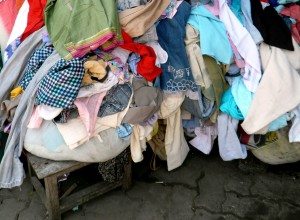Mesothelioma Risk from Recycled Textiles
 Sorting rags for Italy’s textile industry may not sound like a dangerous occupation. But a new study in the Annals of Occupational Hygiene finds that rag sorters in the industrial province of Prato have a significantly elevated risk of malignant mesothelioma.
Sorting rags for Italy’s textile industry may not sound like a dangerous occupation. But a new study in the Annals of Occupational Hygiene finds that rag sorters in the industrial province of Prato have a significantly elevated risk of malignant mesothelioma.
Mesothelioma is a fast-growing and incurable cancer linked to asbestos exposure. Most people who contract mesothelioma have either worked in asbestos mines or with asbestos-containing products in the construction or shipbuilding trades.
However, a hundred and seventy-two cases of mesothelioma were recorded among textile workers in Tuscany between 1988 and 2012. Almost half of them (46.5%) were residents of Prato and half of those Prato workers were rag sorters. In fact, the incidence of mesothelioma among rag sorters in Prato was higher than other textile workers throughout the 1990s.
And mesothelioma was not the only asbestos-related problem for these workers. The study also found 40 cases of other asbestos-related diseases. In addition to mesothelioma, asbestos has been linked to asbestosis, lung cancer, and pleural plaques. The study draws the only logical conclusion about mesothelioma among the Prato rag sorters: That the rags they were sorting were contaminated with residual asbestos fibers.
“A very high incidence of malignant mesotheliomas… together with the high number of other asbestos-related diseases in rag sorters strongly supports the hypothesis of diffuse asbestos exposure in rag sorting, in the absence of any other relevant aetiological factor for malignant mesothelioma,” writes lead investigator Elisabetta Chellini of the Cancer Prevention and Research Institute in Florence.
Rag sorters typically process used or donated fabrics (such as old clothing) to be repurposed for use in paper, yarn, insulation, carpet padding, and other products.
Source:
Chellini, E et al, “Malignant Mesothelioma in Textile Rag Sorters”, February 10, 2015, Annals of Occupational Hygiene, Epub ahead of print





